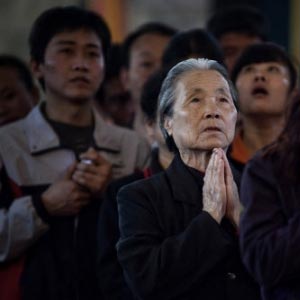by James D. Davis
Religion Editor, Ft. Lauderdale Sun Sentinel
Special to Beliefnet
Crucifixes, Virgin Mary statuettes, ornate Spanish-style churches: so many religious images seem permanently linked with Hispanic Americans. But that’s eroding fast, according to pollster George Barna.
In the fourth update on his annual survey of American religion, Barna says this once-reverent group has been attending church and Sunday school less, volunteering less at church, and reading the Bible less over the last 20 years.
And their religious life is fading faster than those of whites and blacks in America, the report adds.
“The ethnic group that reflected the most profound level of religious change over the last 20 years was Hispanics,” the report says. It adds that Hispanics have changed more than the other two groups both in the degree of religious belief and behavior and across more categories.
How much? Well, in the 14 types of religious belief and behavior Barna measured this January, Hispanics showed “statistically significant change” in nine. And where whites showed drops in single-digit percentage points, most of the Hispanic declines were in the double digits.
Examples: Church attendance for Hispanics has fallen 21 percent, to 33 percent; Bible reading is down from 55 to 30 percent; belief in the accuracy of the Bible has dropped 30 percent to 33 percent. In other words, all three measures have gone from majorities to minorities in 20 years.
Most Hispanics still believe in God as a wise, all-powerful ruler (62 percent) and that their faith is very important to them (51 percent). But those percentages, too, have fallen since 1991 — by 26 percent in the first case, 15 percent in the second.
In only two categories have Hispanics grown percentage wise. Twenty-four percent attend a church of 600 or more members, a quantum leap of 23 percent. But 40 percent don’t attend church at all, except for ceremonies like marriages and funerals — twice as many as in 1991.
Non-Hispanic whites have slid in religious belief and behavior, too, but at a slower rate. Sixty-six percent hold an “orthodox” view of God, versus 72 percent in 1991; 39 percent still attend church, 9 percent higher; 37 percent read the Bible weekly, 5 percent down from two decades ago.
Blacks are the steadiest of the three ethnic groups, changing in only two of the 14 categories Barna measured. Seventy-seven percent have an orthodox view of God, down 11 percent; 30 percent volunteer in church, down 8 percent. And both those rates are higher than those of fellow white and Hispanic Americans.
The Barna report says blacks are more likely than the other groups to say that their religious beliefs are very important and that they have made a “personal commitment to Jesus.” They’re the most likely group to agree on traditional views of God, the Bible and the need to share their religious beliefs with others. Blacks are also the most likely to read the Bible and attend “church-centric activities.”
In his comments on the findings, Barna doesn’t try to explain the fast pace of secularization among Hispanics. One of the biggest surprises for him as a pollster was the doubling of the percentage of unchurched Hispanics over the last two decades, a faster process than those among other Americans.
Barna says the falling-away contradicts “the short-lived wave of immigration to Protestant churches.” But he says Protestants haven’t been gaining ground at the expense of Catholics.
Over the last 20 years, Protestants have accounted for about one of every five Hispanics. However, the percentage of Hispanics in Catholic circles fell 23 points, to its present 45 percent. So most Hispanic ex-Catholics “simply dropped out of organized religion altogether,” Barna says.
“If America’s Hispanic adults are increasingly shifting away from church attendance – or any kind of organized faith experience – the future does not bode well for the expansion of Christianity in the U.S.,” Barna writes.
Solutions? Difficult, even for a thinker like Barna. It will take more than “custom worship services and family programs,” he says. Whatever is done will have to address the steep slide of belief in God and the Bible.


